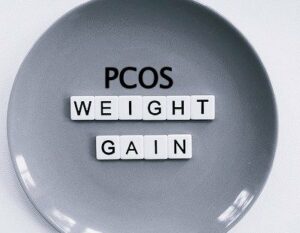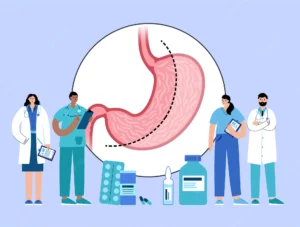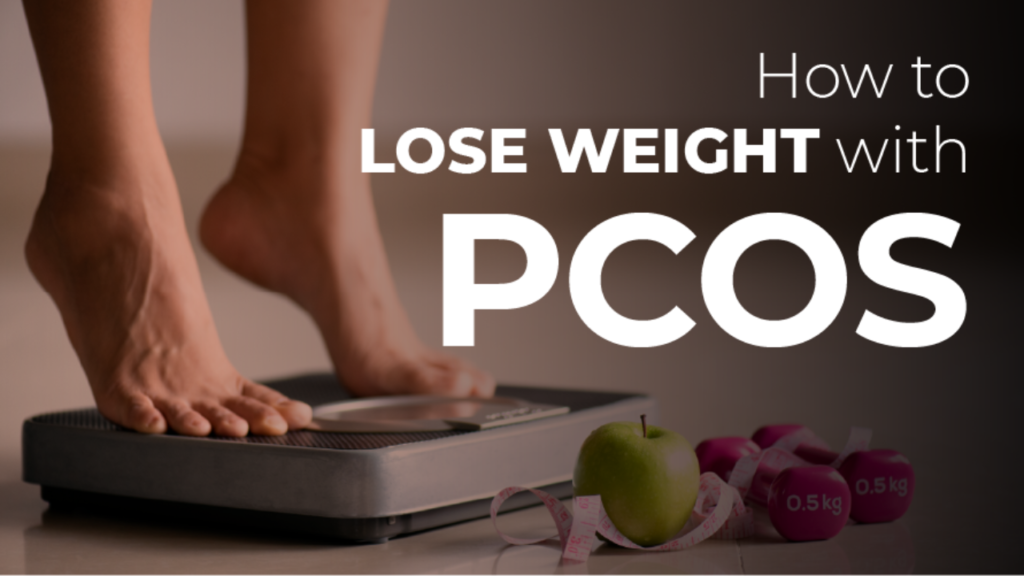PCOS is a common disorder that affects millions of women around the world. If you are one of them, you may be wondering how to lose weight with PCOS. Unfortunately, it can be a bit tricky. However, with some dedication and hard work, you can definitely see results! In this guide, we will discuss the best ways to lose weight with PCOS. We will cover everything from diet and exercise to supplements and lifestyle changes. So, if you are ready to start your journey towards optimal health, keep reading!
Contents
Understanding PCOS And Weight Gain

PCOS, or polycystic ovarian syndrome, is a hormonal disorder that affects women of childbearing age. It is one of the most common causes of infertility. PCOS occurs when the ovaries produce too much testosterone. This excess testosterone then interferes with the normal development and release of eggs during ovulation. As a result, women with PCOS often have irregular periods and may not ovulate at all. This can be incredibly frustrating, especially if you are trying to conceive.
In addition to fertility issues, PCOS can also lead to weight gain. This is because ss testosterone causes the body to store more fat. Additionally, insulin resistance is common in women with PCOS. Insulin resistance occurs when the body does not respond properly to insulin, which can cause blood sugar levels to rise. This can lead to cravings and overeating, both of which can contribute to weight gain.
Consequences
There are many consequences of being overweight, especially if you have PCOS. Some of the most negative impacts include:
- Increased risk of type II diabetes
- High blood pressure
- High cholesterol
- Hypertension
- Breathing problems
- Sleep apnea
- Heart diseases
- Anxiety and depression
If you are struggling with your weight, it is important to remember that you are not alone. Many women with PCOS struggle with their weight. However, there are things that you can do to lose weight and improve your health!
Ways To Lose Weight With PCOS
Managing weight gain with PCOS can happen through various kinds of methods. While most of these ways can be adopted and practiced by themselves, you may want to consult your physician or local healthcare provider for additional tips and prescriptions.
Diet

Regardless of any medical conditions you might have, what you consume has a direct impact on your weight. With PCOS, you might want to consider a few changes to your diet.
First, it is important to eat plenty of fruits, vegetables, and whole grains. These foods are high in fiber, which can help regulate blood sugar levels and promote satiety. Additionally, they are low in calories and will not contribute to weight gain. Some examples of good choices include leafy greens, berries, and quinoa.
You may also want to consider your intake of dairy and red meat. Dairy products are high in calcium, which has been shown to reduce testosterone levels. Red meat is also high in unhealthy fats, which can contribute to weight gain. If you do consume dairy and red meat, be sure to choose leaner options.
It is also important to limit your intake of processed food and simple carbohydrates. These foods are high in calories and can cause blood sugar spikes. They can also worsen insulin resistance. Instead, opt for complex carbohydrates like quinoa, brown rice, and sweet potatoes. If you must eat these foods, be sure to do so in moderation.
You should make sure that you are getting enough protein. Protein helps balance hormones and promotes fullness after meals. Good sources of protein include lean meats, poultry, fish, tofu, legumes, and eggs. Some other important nutrients for women with PCOS can also include:
- Folic acid: This nutrient is important for fertility. You can find it in leafy greens, legumes, and fortified foods.
- B-vitamins: These vitamins are important for energy levels. Good sources include poultry, fish, meat, eggs, and whole grains.
- Zinc: Zinc helps with insulin resistance and can be found in oysters, beef, pumpkin seeds, and legumes.
- Chromium: This mineral helps regulate blood sugar levels and can be found in broccoli, grape juice, potatoes, and chicken.
- Calcium: Calcium helps reduce testosterone levels. Dairy products are a good source of calcium but you can also find it in dark leafy greens and tofu.
- Vitamin D: Vitamin D helps with insulin resistance and can be found in fatty fish, mushrooms, and fortified foods.
Cutting back on sugar is also a good recommendation. Sugar can trigger insulin resistance and cause cravings. When cutting back on sugar, be sure to read labels carefully. Many “healthy” foods are actually loaded with hidden sugar.
Finally, you should stay hydrated by drinking plenty of water throughout the day. Water flushes out toxins and helps keep your metabolism going. It can also help to curb cravings.
Exercise

In addition to diet, exercise is important for managing PCOS and weight gain. Exercise helps to improve insulin sensitivity and can also help regulate hormones. Additionally, it helps burn calories and promote weight loss by boosting metabolism. It can also help to reduce stress levels, which can impact hormone production.
When starting an exercise routine, it is important to consult your doctor first. They can help you create a plan that is safe and effective for you. Once you have the go-ahead, start slow and gradually increase the intensity of your workouts. Generally speaking, aim for 30 minutes of moderate-intensity exercise most days of the week.
A combination of cardio and strength training is ideal. Cardio exercises like walking, jogging, and cycling are great for burning calories and promoting weight loss. Strength training exercises like lifting weights or using resistance bands help build muscle mass and improve insulin sensitivity.
Yoga has also been shown to be beneficial for women with PCOS. Yoga helps to reduce stress, which can trigger hormone imbalances. It can also help improve insulin sensitivity and regulate blood sugar levels. Starting with a beginner’s class is a good idea if you are new to yoga.
Some other forms of exercise can also include:
- Pilates
- Hiking
- Swimming
- Outdoor sports
- Tai chi
- Dance
Remember to listen to your body and take breaks when needed. It is important to exercise regularly but not overdo it.
Medication

There are various kinds of medication that can be used to manage PCOS and weight gain. The most common type of medication is birth control pills. Birth control pills work by regulating hormones and shrinking ovarian cysts. They can improve insulin sensitivity, reduce testosterone levels, and also reduce the risk of developing other complications, such as endometrial cancer.
Metformin is another medication that can be used to treat PCOS. It helps improve insulin sensitivity and can also promote ovulation.
Some other medication also include:
- Arimidex
- Clomid
- Letrozole
- Provera
- Spironolactone
It is important to speak with your doctor about the best type of medication for you. They can help you weigh the risks and benefits of each option and decide what is best for you.
Supplementation

There are also certain supplements that can be useful for women with PCOS. Vitamin D has been shown to improve insulin sensitivity and reduce testosterone levels. It can also regulate periods and improve fertility. Vitamin B12 helps to maintain energy levels, supports metabolism, and promotes cell health. Omega-three fatty acids help to decrease inflammation, which is often a trigger for hormone imbalances. Some other supplements that can be helpful include:
- Chromium
- Inositol
- Magnesium
- Zinc
- Vitex agnus-castus
- Selenium
As with medication, it is important to speak with your doctor before starting any new supplement. They can help you determine the right dosage and make sure that the supplement does not interact with any other medications you are taking.
Natural Therapies

There are also various natural therapies that can help to treat PCOS and promote weight loss.
Acupuncture is one such therapy that can help to improve insulin sensitivity and regulate hormone levels. It can also reduce stress and promote ovulation. It works by stimulating certain points on the body, which helps to encourage balance and healing.
Acupressure is another therapy that can be used to treat PCOS. It works in a similar way to acupuncture but uses pressure instead of needles. Acupressure can help to improve insulin sensitivity and reduce stress levels.
More methods of natural therapies also include:
- Aromatherapy: works by using essential oils to promote relaxation and balance hormone levels
- Ayurveda: uses a combination of diet, lifestyle changes, and herbs to improve PCOS symptoms
- Chinese Medicine: works by balancing the yin and yang energies in the body
- Massage therapy: works by reducing stress and tension in the body
- Reflexology: works by applying pressure to specific points on the feet, which corresponds to different areas of the body
All of these natural therapies can be beneficial for women with PCOS. It is important to speak with your doctor before trying any new therapy to make sure it is safe for you. They can help you to find a therapist in your area and develop a treatment plan that is tailored to your individual needs.
Herbal Remedies

There are also various herbal remedies that can be used to treat PCOS and promote weight loss. Some of the most common herbs include:
- Ashwagandha- helps to reduce stress and anxiety
- Cinnamon- helps to regulate blood sugar levels
- Licorice root- helps to balance hormones
- Red raspberry leaf- helps to regulate hormones and improve fertility
- Turmeric- helps improve insulin sensitivity and can also help regulate hormones
- Spearmint- helps to reduce excess hair growth
- Dong Quai- helps to regulate hormones and reduce inflammation
- Fenugreek- helps improve insulin sensitivity and lower blood sugar levels
- Ginger- helps to reduce inflammation and promote weight loss
- Green tea- helps to boost metabolism and promote weight loss
- Saw palmetto- helps to reduce testosterone levels
Herbal remedies can be taken in the form of capsules, tablets, teas, or tinctures. It is important to speak with your doctor before taking any herbs, as they can interact with other medications you are taking. A doctor can help you determine the right dosage and make sure that the herb does not interact with any other medications you are taking.
Lifestyle Changes

In addition to diet and exercise, there are other lifestyle changes that can help with PCOS and weight gain.
First, it is important to get enough sleep. Sleep helps to reduce stress levels and regulate hormones. Aim for at least eight hours of sleep per night.
Second, you should manage stress levels. Stress can trigger hormone imbalances and make it difficult to lose weight. Consider adding relaxation techniques like meditation or yoga into your routine.
Third, avoid smoking and excessive alcohol consumption. These habits can worsen insulin resistance and contribute to weight gain. If you do smoke or drink alcohol, be sure to do so in moderation.
Finally, it is extremely important to balance your mental health. A healthy and balanced mindset is essential for successful weight loss. Having underlying mental health conditions may also be a contributing factor to weight gain. You may want to consider taking therapy or try self-help tips such as:
- Identify your triggers
- Build a support system
- Set realistic goals
- Create a healthy routine
- Journaling
Making these lifestyle changes can be difficult. However, they are necessary in order to lose weight with PCOS. Be sure to consult your doctor before making any drastic changes. They can help you create a plan that is safe and effective for you. With dedication and perseverance, you can reach your weight loss goals.
Surgery

In some cases, diet and exercise alone are not enough to manage PCOS and weight gain. If you have tried making lifestyle changes but have not seen results, you may want to consider weight loss surgery. Weight loss surgery is a last resort option for those who are struggling to lose weight. There are two main types of weight loss surgery: gastric bypass and gastric sleeve surgery.
Gastric bypass surgery works by reducing the size of the stomach and rerouting the intestines. This helps to reduce the amount of food you can eat and also limits the absorption of nutrients.
Gastric sleeve surgery works by removing a portion of the stomach. It also helps to reduce the amount of food you can eat and limits the absorption of nutrients. This also helps to reduce hunger and promote satiety.
Both procedures are effective for promoting weight loss in those with PCOS. If you are considering weight loss surgery, be sure to consult your doctor first. They will be able to help you determine if surgery is right for you.
Weight loss surgery is a major decision. It is important to speak with your doctor about the risks and benefits before making a choice. Surgery is not right for everyone, but it may be an option if you have been unable to lose weight through diet and exercise alone.
PCOS can be a frustrating condition, but there are ways to manage it and promote ways to lose weight even with PCOS. By following the tips in this guide, you will be on your way to a healthier and happier life.
Conclusion
To conclude the above, there are a lot of ways to lose weight with PCOS. These can be done with the help of a doctor, or by making lifestyle changes. Losing weight can be difficult, but it is possible with dedication and perseverance. If you have tried other methods without success, you may want to consider weight loss surgery. Whatever route you choose, always consult your doctor before making any decisions. With the right plan in place, you can reach your weight loss goals.
This concludes our guide on how to lose weight with PCOS. We hope that this has been helpful for you. If you have any questions or would like more information, please feel free to contact Mantra Care. We have a team of expert dietitians and nutritionists providing help with any nutritional requirements, including weight loss programs or PCOS treatment. Visit our website for more information and bookings.


